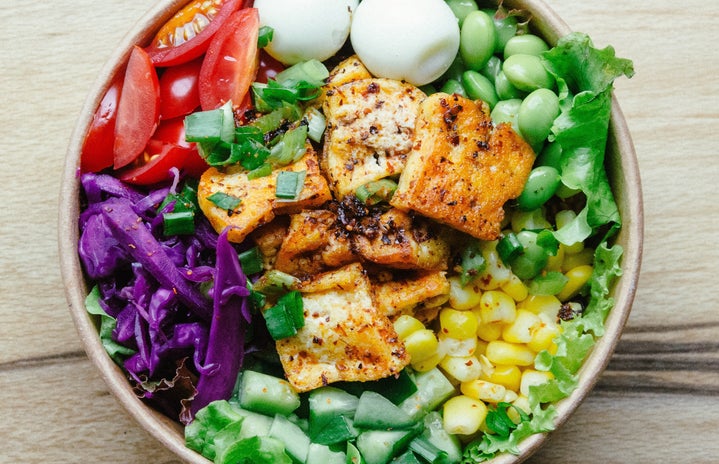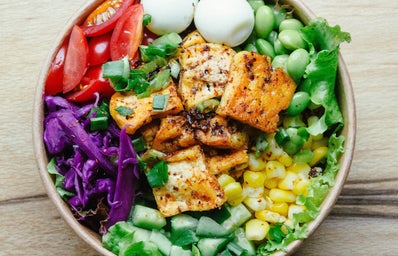Trendy diets have always come and gone, usually gaining a lot of popularity super quick before people know the actual effects. There has been a rising trend of diets in the media right now that people swear by, but are they worth trying? Here’s everything you need to know about some of the hottest diets of the year:
- Keto
-
It seems that the Keto diet is everywhere now. I see it trending on Tik Tok, and I even see Koutney Kardashian advocating for the diet on her social media. Basically, going Keto involves switching to a diet full of fat and low in carbs. It sounds weird, but when the body is deprived of carbohydrates, it goes into a state of ketosis. This metabolic state uses up stored fat in the body as energy, which would normally be supplied by carbs. This diet can cause quick weight loss, as it burns a lot of fat, and keeps you more full than a low-fat diet. Some research has shown that the Keto diet has helped Type 2 Diabetes patients, as it decreases insulin and burns excess fat. There are a number of other health conditions, such as heart disease and some types of cancer, that are using the Keto diet as treatment. Do be aware that some people can experience side effects from switching to a Keto diet as the body adapts.
Foods to avoid: sugary foods, fruits, starches, highly processed foods, alcohol.
Foods to eat: meat, fish, eggs, cheese, nuts, avocados, healthy oils, green vegetables
Overall Review: This is a really good diet if you need to lose excess weight but not such a good one if you’re an athlete that needs to gain muscle. I am not so sure about how eating a diet high in fat would have a long term effect so do your research before trying this diet.
- Paleo
-
The Paleo diet is known as the caveman diet, as it is based on foods that were probably eaten during the Paleolithic era. Foods that can be hunted and gathered for typically pass the Paleo test. The whole point of the diet is to return the body to a diet that is more natural and free from man-made foods. Eating natural foods like fruits and vegetables means you will be full length and will eat less. Going Paleo is not necessarily targeted toward weight loss but rather clean eating. There has not been much research involving the Paleo diet and health issues, so it would be best to do your research before starting this diet, as it may not improve any underlying health conditions.
Foods to avoid: any processed foods, dairy, legumes, sweeteners
Foods to eat: meats (free-range, grass-fed, lean), eggs (free-range), fish, fruits & veg, nuts & seeds.
Overall Review: This diet is very difficult to do, as it is hard to find non-processed foods at the grocery store. You may need to shop at farmers’ markets to find foods that qualify for this diet. As there are no direct health benefits from this diet except potential weight loss, I would not recommend doing this diet for any reason other than personal preference.
- Mediterranean Diet
-
From what I have heard, the Mediterranean diet is apparently THE diet. It is based on traditional foods eaten in Mediterranean countries such as Italy and Greece. Studies have shown that people from those countries were healthier than Americans, so now it has turned into a trendy diet. There is no exact definition of the Mediterranean diet, as foods vary from country to country. Overall, the diet consists of a high amount of fruits and vegetables, fish, and whole grains. The diet recommends a low amount of meat, and no sugars or processed foods. The Mediterranean diet has been proven to show an increase in heart health, life longevity, and weight loss.
Foods to avoid: trans fats, added sugars, white bread, highly processed foods
Foods to eat: vegetables, legumes, whole grains, olive oil, seafood, fruits, low amount of dairy products, and poultry.
Overall Review: This seems like a very healthy and natural diet that should not be as hard as the Paleo diet, but in America, it is still difficult to find unprocessed foods. If you need to improve your heart health or just want to live longer I would definitely try this diet.
- Flexitarian
-
We’ve all heard of vegetarian and vegan, but Flexitarian is the new hybrid of the two. While sticking to mainly a plant-based diet, Flexitarian also allows a small number of animal products and meat. Cutting out all animal products can cause deficiencies in nutrients, so the Flexitarian allows some foods to be eaten to make a nutritious, well-balanced diet. This diet has no clear rules, so it has been hard to study health benefits. Depending on the number of animal products eaten, or lack thereof, the health outcomes can change. Limiting processed foods can help weight loss, and eating a high amount of fiber-rich fruits & vegetables will increase fiber, which also aids in weight loss.
Foods to avoid: processed and refined foods, added sugars, fast food
Foods to eat: plant proteins, green leafy vegetables, fruits, whole grains, plant-based alternatives, organic meats and dairy products in moderation
Overall review: If you find it too difficult to go completely vegan or vegetarian, try Flexitarian. Also, if going vegan/vegetarian is causing a deficiency in a vitamin/mineral for you, Flexitarian should be able to help you get those missing nutrients.



